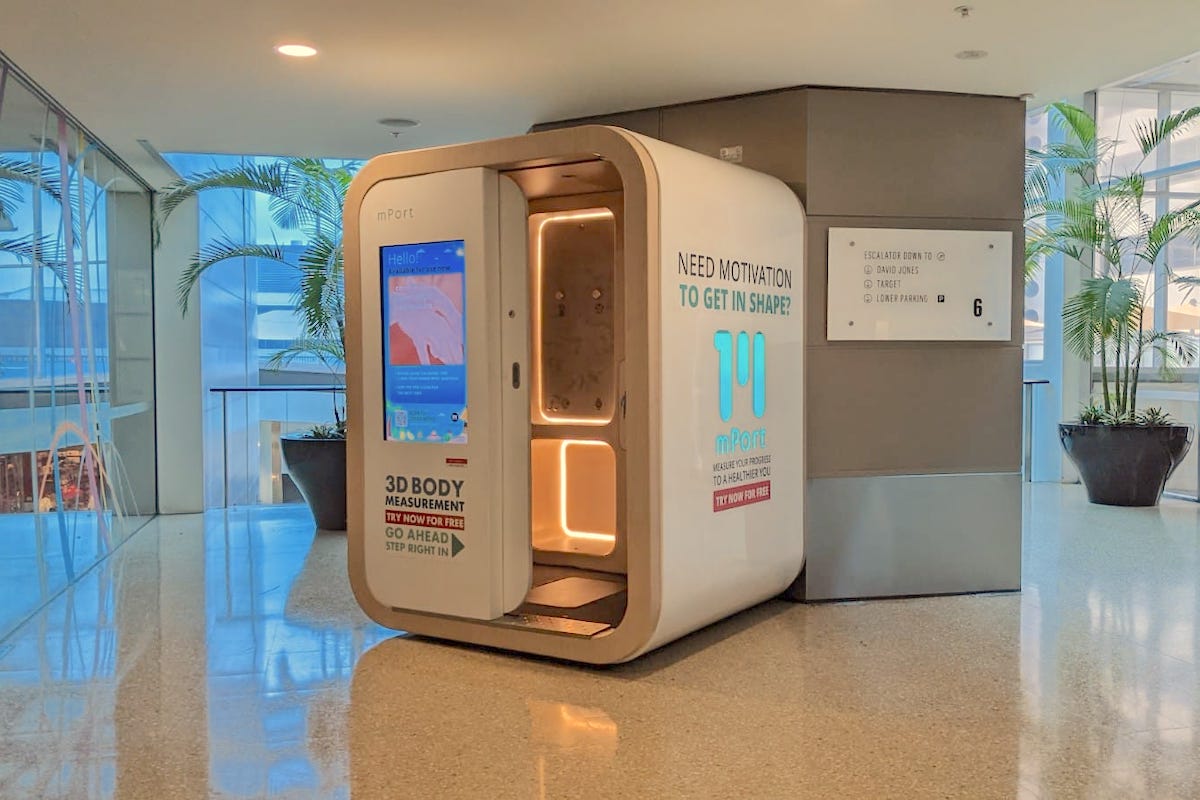We’re used to seeing photo booths in shopping centres, but this huge glowing pod we stumbled across at Westfield’s Bondi Junction took us by surprise.
The first thing we noticed was the clothing hooks inside, so we thought it might be a ‘send nudes’ machine (what with all the promises of 3D body imagery on the side). But actually, it’s something far cooler: it’s arguably the future of shopping.
mPort is an Australian company that has developed these pods as a way for people to quickly and accurately track their health goals. The pods are actually sophisticated 3D body mappers that “use safe, non-invasive infrared technology – similar to what’s inside your TV remote… [which] captures thousands of data points to map the contours of your body and is accurate to within 1cm,” according to their website.
Then, with the aid of a free app, you get a detailed visualisation of your body that can help you “set goals, visualize changes in your body and track your progress on your journey to a better you,” mPort claims.
One part of the service is the health aspect, but the more interesting side to the technology is how it aims to revolutionise e-commerce. They’re developing a functionality whereby you can send your body map to tailors when ordering bespoke clothing, as well as integration with digital fashion retailers for more accurate ready-to-wear sizing when shopping online.
Interact with a 360 degree view of you…welcome to the future👌👍! #mport #mportworld #trackyourprogress #nobodylikeyou #bodytransformation pic.twitter.com/AQxyXYWPc7
— mPort (@mportworld) May 30, 2017
We’re truly living in wild times – but we’ve got a few questions.
Firstly, there’s the privacy angle. While sending your measurements digitally to a tailor might be more convenient or less invasive than being sized in person, there’s a privacy risk. Who else is getting access to your measurements?
The bargain of using most online services is that you give up some privacy in order to use their product – like you use social media sites for free, and they harvest your data to sell to advertisers. For example: what if your health data was provided to your health insurer, who then jacks up your premiums because they don’t like your body shape?
Secondly, we have to question Westfield’s motives behind installing mPorts in their shopping centres. If the goal of the mPort is to make e-commerce simpler, and therefore take even more customers away from brick-and-mortar retail, why allow them to operate in your premises? They’re a potential Trojan horse; a competitor stealing customers right out from under you. Ultimately, that’s a concern for Westfield, not a problem with mPort per se.
But it’s worth not being too cynical. It’s pretty science-fiction that mPorts even exist, and they certainly provide a unique service. We should celebrate innovation – especially home-grown innovation – without immediately jumping to a ‘tall poppy syndrome’ judgement.
mPort shows no sign of slowing down – there are already dozens of pods in all Australian states and territories except Tasmania and the Northern Territory, and mPort have even penned a deal with LA Fitness, an American gym chain with more than 700 clubs across the United States and Canada. Time will tell if these sorts of technologies become more commonplace in public spaces around us, and how they’ll affect the ever-changing world of e-commerce.
